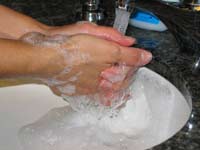Moisturizers
- home
- Natural Moisturizer
- Moisturizers

Help! My job dries my skin I need moisturizers!
I know, I wash my hands 2 to 3 times a flight. If I don't keep moisturizer on my hands, they do get chapped. My dermatitis will start under my ring finger if I don't take the time to dry my hands.
Does your job leave your skin dry, cracked and irritated? You are not alone. Workers in many different occupations, including nursing, hair styling and construction, are exposed to chemical or environmental irritants, or frequent hand washing, as a normal and necessary part of their jobs. This can lead to dry, inflamed skin and a condition called occupational dermatitis.
Since the day-to-day functions of these jobs are not going to change, occupational dermatitis can become a chronic problem. The good news is there are strategies and products available to help control symptoms without interfering with your ability to do the job.
The first step in managing occupational dermatitis is to identify the triggers associated with flare-ups. For example, hair stylists are frequently exposed to chemicals in hair dyes and are constantly submerging their hands in water. Nurses and other healthcare workers wash their hands regularly, and construction workers can be exposed to extreme weather conditions, especially in the winter months.
All of the above can lead to tight, rough and itchy skin that causes an itch-scratch-itch cycle that can result in significant damage to the skin and further irritation.
So, step two is avoiding these triggers. This is easier said than done. A nurse cannot simply stop washing his or her hands, nor can a hair stylist stop washing hair. The third step, then, is to identify strategies to lessen the effect of these on-the-job realities.
To reduce the appearance of red, irritated skin your doctor may prescribe a topical medication or corticosteroid to help treat your flare-ups. To keep skin soft and supple, it also is critical to choose an effective moisturizer and use it on a regular basis.
Choose a moisturizer that is non-irritating, non-greasy, fragrance-free and long lasting, such as Cetaphil Therapeutic Barrier Cream, so it will not interfere with your day-to-day tasks. This particular cream contains shea butter, a natural ingredient that is soothing and moisturizing while providing additional protection.
The best time to apply a moisturizer is right after you wash your hands. Make it a habit to do so and you will be sealing in the natural moisture your skin absorbed from the water as you wash up.
Another important way to prevent flare-ups is to wear protective gloves when working with chemicals. While latex can cause additional irritation, non-latex gloves are available and are equally effective. Outdoor workers should always wear protective gloves to limit the skin's exposure to the elements. Try applying a coat of moisturizer before slipping the gloves on for added protection.
Chronic dry skin caused by occupational dermatitis can be controlled. The key is to identify your triggers, eliminate exposure to them, and lessen the effects through treatments and moisturizers that protect and lubricate the skin. Talk with your doctor about ways to identify and manage your condition. More information about moisturizers is available at www.cetaphil.ca.
- News Canada
-
"As an Google Associate I earn from qualifying purchases."